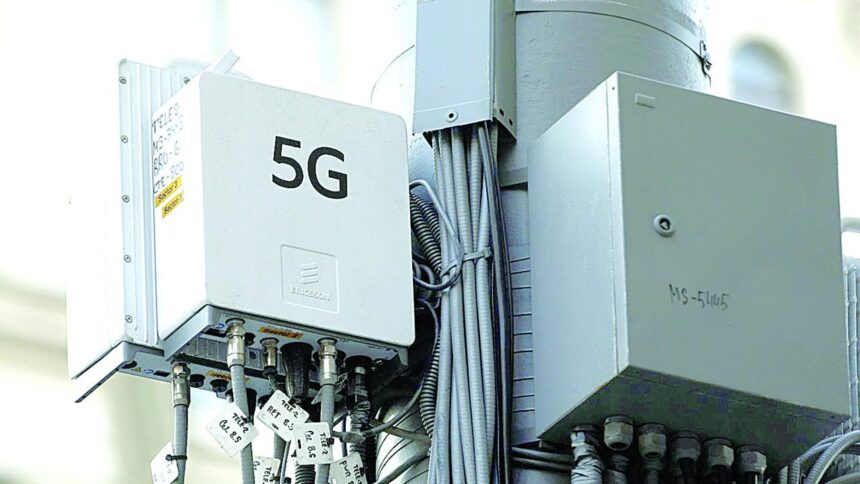When Nigeria’s 5G network coverage arrived in 2022, the country positioned itself as a technological frontrunner in Africa. Policymakers spoke confidently of a future powered by ultra-fast connectivity, AI-enabled industries, and digital public services running at global standards.
Three years later, the reality is far more modest, as only 3 per cent of all internet subscribers in Africa’s largest economy are on 5G, according to newly published data from the Nigerian Communications Commission (NCC). That equates to just over four million users in a country of more than 220 million people.
Across the Atlantic, 5G adoption is accelerating so rapidly that global connections surpassed 1.5 billion by the end of 2023. In Africa, early adopters like South Africa, Kenya, and Tanzania have moved faster, driven by more competitive device markets and stronger infrastructure coordination.
Nigeria, despite its size, market potential, and early licensing advantage, is falling behind.
The Promise That Hasn’t Been Fulfilled
Nigeria had three licensed 5G operators in MTN, Airtel, and Mafab Communications. Only the first two have deployed networks. Mafab, despite acquiring spectrum at the same time, has yet to build a single mast.
A senior telecoms policy expert at a Lagos think tank told Techparley that the delay reflects a broader structural issue.
“Spectrum auctions are seen as revenue events, not development events. When you price spectrum aggressively but fail to provide favourable conditions to build infrastructure, you end up with vacant licences and half-executed rollouts,” Dele Basiru said.
Nigeria collected hundreds of millions of dollars from the auction, but operators were then left to battle rising inflation, currency shocks, vandalism, and soaring energy costs without the supportive incentives seen in other regions.
MTN and Airtel have activated 5G sites mostly in major urban centres. But unlike 4G, which reached a near 45 per cent penetration, experts say 5G faces a tougher socioeconomic environment and higher technical requirements.
A Global Boom, But A Local Bottleneck
To understand Nigeria’s struggle, it helps to compare its trajectory with global momentum.
GSMA estimates that Africa will have over 340 million 5G connections by 2030, representing one-fifth of all mobile links on the continent. Nigeria should be leading that charge, given its population and digital economy ambitions.
However, Basiru noted that the disparity is not surprising.
“5G is not like 4G where a single tower can serve a wide radius. You need dense fibre backhaul, significantly more power, and a consistent currency environment. Nigeria has challenges across all three,” he said.
In rural Africa, fibre scarcity limits 5G expansion. In Nigeria, Basiru claims the issue is compounded by sabotage, theft, and routine destruction of underground infrastructure.
The True Cost of 5G
Experts described device affordability as the single most important barrier to 5G in West Africa.
“Most Nigerians simply cannot afford a smartphone above $150, yet that’s the entry point for many 5G devices. To get mass adoption, you need phones at $40–$50. Until then, 5G remains aspirational,” James David, a mobile device market analyst, told Techparley.
Even as manufacturers like Tecno, Xiaomi, and Infinix introduce lower-priced models, 5G handsets still carry a large price premium compared with 4G devices.
GSMA estimates that the removal of taxes and import duties on sub-$100 smartphones could reduce prices by up to 50 per cent, unlocking access for millions.
Yet, Nigeria maintains a complex system of import levies, FX constraints, and local assembly policies that raise costs rather than reduce them.
“Until governments treat smartphones as essential productivity tools like textbooks or agricultural inputs, the affordability problem will persist,” James added.
What is Slowing 5G?
According to technology experts, behind the scenes, Nigeria’s telecom infrastructure is under unprecedented strain.
1. 5G Requires Dense Fibre
Although the country has multiple subsea cables, domestic fibre distribution is thin. Operators often rely on microwave links, useful for 2G and 3G but insufficient for high-capacity 5G.
“For 5G to work at scale, fibre must run like water pipes across the entire city. But here, every kilometre of fibre is a battle, either you’re negotiating right-of-way charges with dozens of agencies, or you’re repairing vandalised lines,” James said.
Right-of-way costs vary wildly from state to state, hindering nationwide expansion.
2. Vandalism Is Bleeding Operators Dry
According to industry insiders, fibre vandalism has become the “silent crisis” of Nigerian telecoms.
Bloomberg reported that operators lost N27bn to fibre cuts and repairs in 2023 alone. MTN relocated over 2,500 km of vulnerable fibre, spending more than N11bn, funds equivalent to building 870 km of new fibre in underserved areas. Experts say this is a problem affecting growth.
3. Power Costs Are Crushing 5G Economics
Nigeria’s power deficit means telecom towers rely heavily on diesel generators. Operators report diesel costs rising over 300% in 36 months.
Industry leaders say 5G consumes significantly more power than 4G. With diesel at unstable prices and grid supply unreliable, rolling out 5G becomes financially irrational in many regions.
The NCC noted that industry-wide operating expenses jumped by 50.92% in 2023 alone, erasing gains made through infrastructure sharing and energy-efficient hardware.
4. Policy Contradictions Are Holding the Industry Back
Despite the rising cost of doing business, the NCC has repeatedly warned operators against raising tariffs. Analysts say this creates a policy contradiction where the government encourages next-generation investment but restricts the commercial flexibility needed to fund it.
Unless Nigeria reforms right-of-way charges, reduces device taxes, and formally protects telecom infrastructure as Critical National Infrastructure (CNI), the 5G rollout will remain sluggish.
What Must Happen for Nigeria to Catch Up
Every expert we spoke with arrived at the same conclusion, that Nigeria’s slow 5G penetration is not a technological problem but an economic and policy challenge.
1. Radical Reduction of 5G Device Costs
Africa needs ultra-affordable smartphones in the $30–$50 range, supported by:
- Removal of taxes and duties
- Incentives for local assembly
- Partnerships with global manufacturers
2. National Fibre Strategy and CNI Protection
Nigeria must:
- Standardise right-of-way charges nationwide
- Criminalise fibre vandalism with severe penalties
- Build a national fibre backbone that competitors can lease at fair prices
3. Tariff Reform for 5G Sustainability
Operators need realistic pricing models to recover investments, especially as power, equipment, and FX costs continue to surge.
4. Expanded Infrastructure Sharing
Co-using towers, ducts, fibre, and power systems can reduce deployment costs by as much as 40%.
5. Embrace Hybrid Connectivity Models
Satellite services like Starlink, Avanti, and OneWeb are transforming access in remote regions, but cannot replace terrestrial fibre. A blended approach is essential.
Nigeria is not short of ambition. It is short of alignment. Experts agree that the country can still become Africa’s largest digital economy, but only if it confronts the hard economic realities that underpin network deployment.
For now, the country’s 5G revolution remains a promise waiting to be fulfilled. Analysts say whether it becomes a turning point or another missed opportunity depends on decisions made in the next two years.
Talking Points
It is concerning that three years after Nigeria’s 5G launch, coverage remains at only three per cent, despite the country’s size, market potential, and early spectrum investment. This slow uptake signals deep structural issues that go beyond technology availability.
At Techparley, we observe that the biggest barrier is device affordability. Without low-cost 5G smartphones, even the best infrastructure will struggle to achieve meaningful adoption. Until manufacturers, regulators, and industry partners work together to bring device prices closer to the mass-market range, 5G risks becoming a premium service for a small segment of urban users.
Despite these setbacks, the potential impact of 5G is clear. The technology promises stronger capacity for digital services, remote work, smart industries, and public sector innovation. With proper policy alignment, Nigeria could unlock billions in economic value across sectors like manufacturing, agriculture, and retail.
With coordinated action, Nigeria can move from stalled progress to continent-wide leadership in next-generation connectivity.
——————-
Bookmark Techparley.com for the most insightful technology news from the African continent.
Follow us on Twitter @Techparleynews, on Facebook at Techparley Africa, on LinkedIn at Techparley Africa, or on Instagram at Techparleynews.





